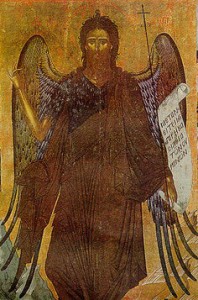 Jewish Angelomorphic/Theotic Traditions
Jewish Angelomorphic/Theotic Traditions
“Qualified You to Share in the Inheritance of the Holy Ones in Light”
At the outset of the epistle, Paul addresses those in Colossae who are “εν Χριστω” (in Messiah 1:2), as he addresses most of the assemblies[1] he writes to using the designation “αγιοις” or the “holy ones” (1:2).[2] It is regrettable that commentators have neglected to thoroughly discuss the background of the title “holy ones” in Colossians. As will be demonstrated in the present study, its meaning is vital to Paul’s understanding of the community as it denotes the angelomorphic/theotic character of those “in Messiah”, situating Paul firmly in the apocalyptic traditions of Second Temple Judaism.[3]
The term’s Jewish roots may be found in the Hebrew Bible[4] beginning with Exodus 19:6, “and you shall be to me a kingdom of Priests and a holy nation.” The reason for the attributive designation “holy” is theotic as seen in Leviticus 11:44a, “For I am YHWH your god. Consecrate yourselves, therefore and be holy, for I am holy.”[5] The holy kingdom of priests established at Sinai are to be like YHWH, the theotic expression of himself in the world because YHWH himself is holy.
The Deuteronomist tells of Moses on his death bed recounting the Sinai event, “… YHWH came from Sinai and dawned from Seir upon us; he shone forth from Mount Paran; he came from the ten thousands of holy ones, with flaming fire at his right hand. Yes, he loved his people, all his holy ones were in his hand”.[6] Here YHWH’s heavenly host and divine entourage along with the people at Sinai are called his “holy ones”. Those constituted as YHWH’s people at his mountain, share a heavenly existence on earth corresponding to the host of heaven. They are priestly ministers of the Most High God sharing a similar function as their heavenly ministerial counterparts[7]. The epithet seems to refer primarily and originally to the divine beings that inhabit the heavens, those of which are frequently described by OT scholars as the divine council[8].
The attribution of the heavenly title “holy ones” to the earthly community as a theotic or angelomorphic expression is developed substantially in the Second Temple period, rooted in texts like Daniel where the term denotes the heavenly beings[9] as well as those who remain faithful to the Most High in the eschatological time of trial.[10] Daniel 12:2-3 is a programmatic text for subsequent understandings of the concept of vindication by resurrection for the earthly “holy ones” who have suffered and subsequently receive an angelomorphic translation as expressed in the following terms: “those who are wise shall shine like the brightness of the firmament above; and those who turn many to righteousness, like the stars forever and ever.”[11] The context of this heavenly translation is the arising of Michael the great prince who had previously stood against the evil heavenly forces such as the “prince of the kingdom of Persia” (10:13) and the “prince of Greece” (10:20). These “princes” are understood as the patron angels of the nations[12] and may be those referred to as the “host of heaven” or as the “stars” (8:10).[13] This is significant as the implications may be that the angelomorphic/theotic language applied to the vindicated righteous is to be understood as a change in the heavenly rule over the nations.[14]
The Wisdom of Solomon interprets the tradition along these same lines when speaking of the vindication of the righteous in 3:7-8: “In the time of their visitation they will shine forth, and run like sparks through the stubble. They will govern nations and rule over peoples.” In 5:7-8 we see the questioning of the oppressors at the eschatological judgment as the righteous are vindicated: “Why have they been numbered among the sons of God? And why is their lot among the holy ones? So it was we who strayed from the way of truth, and the light of righteousness did not shine on us, and the sun did not rise on us.”[15] So it follows that the angelomorphic shining of the righteous is linked to them governing nations and ruling peoples. This seems to implicitly refer to an eschatological change in authority where the angels of the nations have been replaced by the angelomorphic human righteous.[16]
There is a great deal of subsequent Second Temple Jewish apocalyptic literature that reflects Daniel and Wisdom’s angelomorphic language.[17] In 1 Enoch 38:4-5, in a similar context of judgment and overturning of the world powers as in Daniel one reads:
“…and from that time, those who possess the earth will neither be rulers nor princes, they shall not be able to behold the faces of the holy ones, for the light of the Lord of the Spirits has shined upon the face of the holy, the righteous, and the elect. At that moment, kings and rulers shall perish, they shall be delivered into the hands of the righteous and holy ones”.[18]
We see similar language later in 1 Enoch 104:2-5:
“I swear unto you that in heaven the angels will remember you for good before the glory of the Great One; and your names will be written before the glory of the Great One. Be hopeful, because formerly you have pinned away through evil and toil. But now you shall shine like the lights of heaven, and you shall be seen; and the windows of heaven shall be open for you. Your cry shall be heard. Cry for judgment and it shall appear for you… Be hopeful, and do not abandon your hope… you are about to be making a great rejoicing like the angels of heaven. You shall not have to hide on the day of the great judgment, and you shall not be found as the sinners; but the eternal judgment shall be (far) away from you for all generations of the world.”
Following the same tradition is 2 Enoch 66:7: “how happy are the righteous who shall escape the Lord’s great judgment; for they will be made to shine seven times brighter than the sun.” In 2 Enoch, this is an unmistakable reference to angelomorphism, and possibly exaltation over the angels, as Stone points out that previously in 2 Enoch 1:5 and 19:1 it is the faces of the angels in heaven that shine like sun.[19] 4 Ezra 7:88-97 follows in the same apocalyptic vein:
“… those who have kept the ways of the Most High… they shall see with great joy the glory of him who receives them, for they shall have rest in seven orders… the sixth order when it is shown to them how their face is to shine like the sun, and how they are to be made like the light of the stars, being incorruptible from then on… for they hasten to behold the face of him whom they served in life and from whom they are to receive their reward when glorified.”
The Jewish eschatological trend of angelomorphism and exaltation over the angels for those who are saved from the final judgment is demonstrated further in 2 Baruch 51:8-10, 12:
“For they will see that world which is now invisible to them, and they will see a time which is now hidden to them. And time will no longer make them older. For they will live in the heights of that world and they will be like the angels and be equal to the stars… And the excellence of the righteous will be greater than that of the angels.”
In the Testament of Moses 10:9 it is said of Israel “God will raise you to the heights. Yea, he will fix you firmly in the heaven of the stars, in the place of their habitations.”[20]
It is through this particular Jewish apocalyptic matrix that we can begin to understand the belief shared by Paul of an “inheritance of the holy ones in light” (Col 1:12). How one is “qualified to share in” (1:12) this inheritance for Paul is by faith[21] and participation[22] in Messiah. For him the people, known as the “holy ones”[23], who share the heavenly hope (1:5) of eschatological vindication by angelomorphic/theotic translation and exaltation over the angels is realized now as those who are “in Messiah”. The hope reserved in the eschaton for faithful Israel is now further extended to the Gentiles and is being realized for all those “in Messiah”. As Paul states:
“And you, who once were alienated and hostile in mind, doing evil deeds, he has now reconciled in his body of flesh by his death, in order to present you holy and blameless and above reproach before him, if indeed you continue in the faith, stable and steadfast, not shifting from the hope of the gospel that you heard (1:21-23a)… to them God chose to make known how great among the Gentiles are the riches of the glory of this mystery, which is Messiah in you, the hope of glory (1:27).”
The Gentiles who were once “alienated and hostile in mind, doing evil deeds” (1:21) he now refers to as “God’s chosen ones, holy and beloved” (3:12) applying the language derived from the HB, yet filtered through the Second Temple Jewish apocalyptic matrix for those who will inherit the eschatological vindication and angelomorphic translation for their faithfulness to God. Some of the essential grounds Paul has for legitimating the application of this language to Gentiles comes from a nexus of ideas pertaining to his understanding of what it means to be “in Messiah”: they have been forgiven their sins, received a heavenly circumcision, and a disarming of the rulers and authorities that once ruled over them has taken place, allowing for a transferal to the heavenly kingdom:
“And you, who were dead in your trespasses and the uncircumcision of your flesh, God made alive together with him, having forgiven us all our trespasses, by canceling the record of debt that stood against us with its legal demands. This he set aside, nailing it to the cross. He disarmed the rulers and authorities and put them to open shame, by triumphing over them in him (2:13-15).”
[1]The term “εκκλησσια” will be translated in the following study as “assembly” merely as a subtle nuance to disallow any confusion of later Christian theology to obscure the Jewish nature of Paul’s own understanding.
[2] Rom 1:7; 15:25; 1 Cor 1:2; 16:15; 2 Cor 1:1; Eph 1:1; 3:5; 5:3; Phil 1:1; 2 Thess 1:10. For other uses of the term in the NT cf. Acts 9:13; Heb 6:10; Jude 3; Rev 11:18.
[3] See Col 1:2, 4, 22, 26: 3:12
[4] The abbreviation HB will be used in the following study to refer to the Hebrew Bible or the Protestant Old Testament.
[5] Cf. Lev 19:2; 21:7-8; Num 16:3
[6] Deut 33:2-3a. Other texts that use the heavenly epithet to refer to YHWH’s people are Ps 16:3; 34:10 (9); 106:16.
[7] “Counterpart” not in the sense of later Jewish and Christian theological developments of an ontological heavenly counterpart for each human, but rather simply to highlight functionally the remarkable similarity in function and designation by the employment of the heavenly title to those on earth.
[8] Job 5:1; 15:15; Ps 89:5-7 (Eng): This text speaks of the incomparability of YHWH amongst the others among him that seem to share some sort of “species uniqueness” with him which would explain the need to express his superiority by stating that he is “a god greatly to be feared in the council of the holy ones”; For a thorough discussion on the continued conceptual understanding the notion of the Divine Council into the Second temple period see Michael S. Heiser, “The Divine Council in Late Canonical and Non-Canonical Second Temple Jewish Literature” (Ph.D. diss., University of Wisconsin-Madison, 2004).
[9] Dan 4:8, 9, 17, 18; 5:11; 8:13
[10] Dan 7:18, 21, 22, 25, 27; 8:24; 12:7. The view that the “holy ones” in Dan 7 refers to human beings has been contested. Cf. John J. Collins, Daniel: A Commentary on the Book of Daniel (Hermeneia: A Critical and Historical Commentary on the Bible; Minneapolis: Fortress Press, 1993), 313-317.
[11] Collins states that the shining like the firmament should be equated with the stars. This is based on 8:10 in identifying the host of heaven as the stars. Collins, Daniel, 393. The heavenly host, whether to be understood in terms of divine council or angels, represented or realized as stars is a tradition represented throughout the HB cf. Deut 4:19 (corresponding to the “gods of the nations” in 17:3 and the “sons of God/angels of God” in 32:8); Judg 5:20; 2 Kings 17:6; 21:3, 5; Job 22:12; 38:7; Ps 148:3; Is 14:12-13; 40:26; 48:13; Jer 19:13; 33:22; Amos 5:26; Zeph 1:5.
[12] Collins, Daniel, 374. The origin of this concept within the HB is found in Deut 32:8-9 at the appointment of the angels (LXX) or the sons of god (4QDeut) as patron angels or deities over the nations while YHWH directly rules over Jacob. Ps 82 reflects this tradition and speaks of the coming judgment of the “gods” due to their unjust rule, ending with a plea for God to inherit all the nations from their oppressive heavenly rulers.
[13] This idea may be akin to a similar conceptual framework as Deut 4:19 (in relation to 32:8-9) or possibly from the “assembly of the stars” idea presented in Is 14:12-13.
[14] This may demonstrate the author of Daniel’s understanding of the theology of Ps 82 as the angelomorphic righteous ones inherit the nations because they have been translated to mediatorial ruling representatives under the restored rule of God.
[15] This citation and all subsequent citations of the Apocrypha are taken from Howard C. Kee, ed., The Cambridge Annotated Study Apocrypha: New Revised Standard Version (Cambridge: Cambridge University Press, 1994).
[16] Again, we see here a reflection of a worldview rampant in Jewish apocalyptic discourse that has been shaped by texts such as Deut 32 and Ps 82, as seen programmatically appropriated in Daniel.
[17] There is no space here to discuss dating of such texts, but merely to observe conceptual parallels.
[18] This citation and all subsequent citations of Pseudepigraphical literature are taken from James H. Charlesworth, The Old Testament Pseudepigrapha: Volumes 1 and 2 (Peabody, Mass: Hendrickson, 2010).
[19] Michael E. Stone, Fourth Ezra: A Commentary on the Book of Fourth Ezra (Hermeneia: a Critical and Historical Commentary on the Bible; Minneapolis: Fortress, 1990).
[20] See further Philo, Vit. Mos. 2.288; b. Ber. 17a.
[21] Col 1:2, 4; 2:5, 7.
[22] Col 1:2, 27, 28; 2:6, 7, 10, 11.
[23] Cf. Col 1:2, 4, 22, 26: 3:12.



